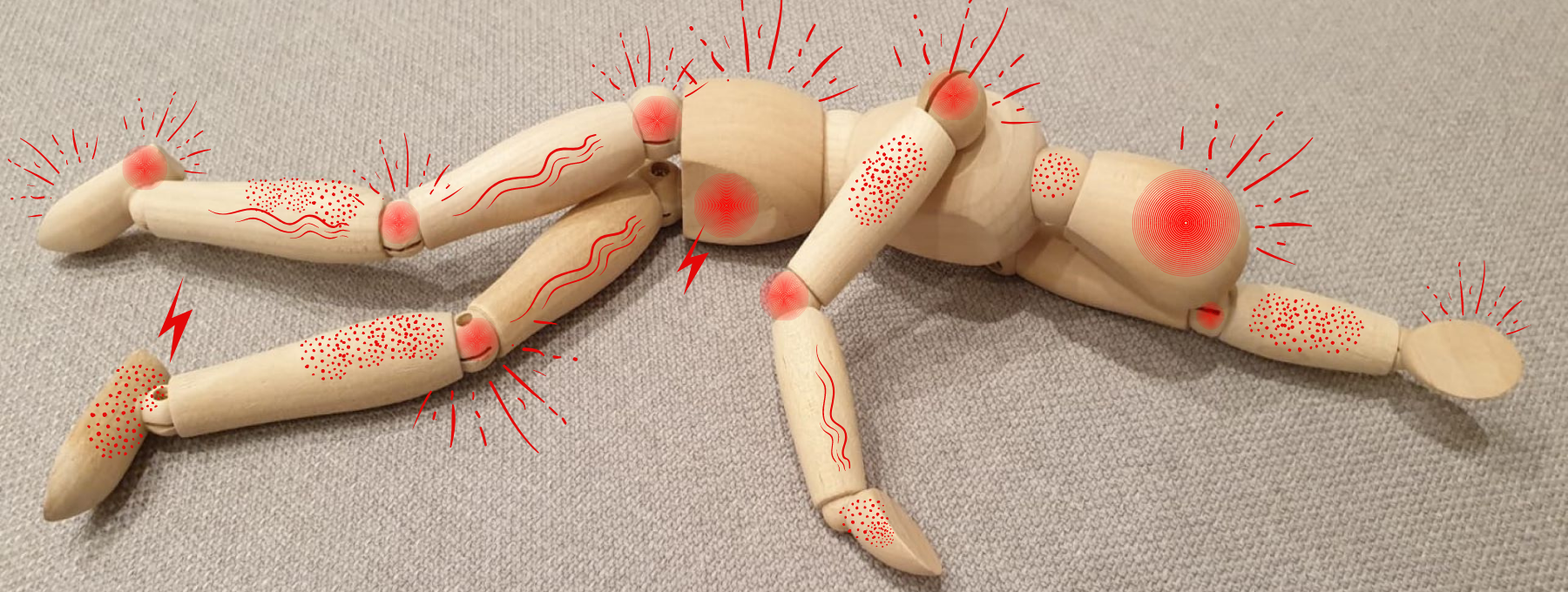Pain
Pain is a common and complex symptom of ME/CFS.

Types of pain
- deep muscle aches and pains, burning, cramps, trigger point pain, spasms, twitches, tingling, pins and needles
- joint pain, without swelling or redness
- nerve pain, including stabbing and burning sensations
- headaches of a new type, pattern, or severity, including migraine and neck pains
- sore throat
- tender lymph nodes
- abdominal pain, including gut and gynaecological pain
- costochondritis (inflamed cartilage at the end of ribs in the chest)
- environmental sensitivities, causing pain in response to: touch (allodynia), light (photophobia), noise (hyperacusis), pressure (hyperalgesia), temperature, vibrations/movement
Pain may be localised, widespread or migratory.
The type and severity of different types of pain may vary across time from mild to severe. Pain is likely to worsen as overall symptoms increase, including during relapses or post-exertional malaise (PEM).
Fibromyalgia (FM) is marked by muscle tenderness and generalised pain. An estimated 30-70% of people with ME/CFS have diagnosable Fibromyalgia, and a referral for Fibromyalgia diagnosis may be indicated.
Management
Pain management must include both strategies to avoid exacerbating overall symptoms and approaches that work best for the type and severity of pain.
- Use pacing to keep activities within available energy reserves.
- Address sleep issues.
- Avoid environmental exacerbators, for example have comfortable clothing, dim lighting, a quiet environment, etc.
- Calm the autonomic nervous system (ANS) using strategies such as relaxation techniques, meditation, transcutaneous vagus nerve stimulation (tVNS).
- Distract attention from pain by using activities or focussing thoughts elsewhere.
The following are commonly recommended by patients and clinicians:
- massage therapy
- acupuncture
- applying heat or cold
Treatment
Treatments will differ according to the type and severity of pain.
Medications
Pain medications are often prescribed, the choice being guided by the type and severity of the pain. Medications may be effective singly or in various combinations.
Given the lack of research into pain relief in ME/CFS, therapies must be guided by the benefits and side effects experienced by the individual.
Nutritional supplements
Patients and clinicians commonly recommend magnesium. It is available for topical use as magnesium oil or Epsom Salts. Magnesium can also be taken orally. Oral magnesium comes in a variety of forms, for example magnesium citrate, sulfate, glycinate, etc. Each form affects the body differently, with different benefits and side effects. Diarrhoea is a common side effect.
Start medications at a low dose, as usual doses may be poorly tolerated by people with ME/CFS.
Introduce one change at a time, so that the impact can be monitored.
Last edited: 22 July, 2022
